* * *
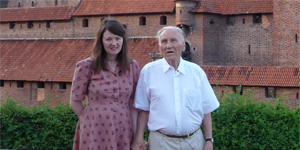
Having spent three days together filming, talking and getting to know each other, on the last day of the trip Kazik wanted to take me to some of the places he loved as a child: Tczew, his hometown, the Gothic castle Malbork, and the little Church of Sanktuarium sw. Wojciecha w Gorzedzieju on the hill looking down at the Vistula River. Driving through the pretty Polish countryside to Tczew, around 30 kilometres from Gdansk, the surrounding fields were golden with corn and sunflowers and the mood was one of glowing positivity. On approaching the town, Kazik began to sing the Polish national anthem, happily telling me that he knew every road and every building in the locality. With a bright smile, he pointed out his secondary school, Jurgo Steet, named after his childhood best friend, as well as the spot where his family used to live.
Parking beneath a row of horse chestnut trees, Kazik was keen to get out of the car and show me around the Municipal Park. “Come, I will show you everything my dear!” he beamed, reminding himself of how he used to play there as a child. Walking around, I began to understand why this place meant so much to Kazik; you could hear so many birds – woodpeckers, sparrows, blackbirds, thrushes – and the gentle rises and falls of the slopes gave it a magical feeling. ”Look at this greenery! We use the colour green to describe all these plants, but this one is a completely different green from that one,” he said, pointing to some of trees. Some of them were casting prettily patterned shadows on the ground. “You have a very romantic spirit,” he laughed, noticing my gaze. “Not everybody notices these dancing tree shadows.”
He then took me to see the open air theatre, bursting into song as he did so. “They sing opera here too!” he laughed, and suggested that one day I should bring my band to Tczew and play in this space. Standing proudly with a cheeky grin on his face, he reminisced a little more. ”I became a boy scout at the age of 11 years old,” he smiled. “I remember we had bows and arrows. We would hide in the bushes and aim at the trees. It was such great fun being with all my friends!… I had a choice when I was younger: to play in the park and swim in the Vistula River, or go to school. Up until secondary school I chose the park and the river. Later I studied.”
As we carried on walking, Kazik looked at me, suddenly grave, and said “I’ll show you this stone.” Turning the corner, I realised why it was so important that he bring me to the park. Far from being an ordinary stone, he was showing me a memorial plaque. At the top, in the centre, was a Polish scout symbol with the words ‘Czu Waj’, or, in English, ‘Be prepared’. It was a monument to all the young girl and boy scouts that were murdered in Tczew on September 4, 1939, just as Kazik had described. Pointing to all the Polish names engraved on the stone, he said, “These were all my childhood friends, from school and scouts. What a terrible and tragic loss, all those young lives lost.”
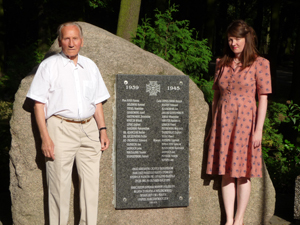
Reading down the list of names, he began to tell me a bit about each one: how old they were, where they lived in the town etc. Recalling our previous conversation, I asked him again about Jurgo. “My very best friend, he was shot trying to help us escape,” he said, clenching his fist. “He was such a great lad. If anyone less fortunate or from a poor family was being bullied, Jurgo would always protect them… I was an Eagle scout. We were taught to be ready to help anybody in need – old people, young children, our parents – to help our community. The Germans knew that to get rid of the pillars of the community would hopefully weaken our spirit, but it didn’t. It made us want to rebel against them even more. The tragedy of it all is that so many great people were murdered by the Nazis for doing nothing wrong except for just being Polish.”
We left the park on a sombre note. Having Kazik personally explain the memorial stone in such detail really brought history into my reality, into something that an ordinary passerby might barely give pause to. I felt more connected to my mother’s heritage than ever, and at the same time so terribly sad. I wanted to cry and rage against it, to commemorate the grief of Poland, the country that stood no chance in the wake of such a brutal and surprise attack from the Germans. As we left the town, I looked again at the countryside and imagined how hard it would have been for Kazik to hide anywhere. His plan of escape would probably never have worked.
Approaching the church on the banks of the Vistula River, where Kazik would often swim as a boy almost 80 years before, we encountered a young monk standing at the door, who invited us in to help ring the bells. There we met the eccentric Madame Wanda, a woman with purple hair and a cheeky smile who explained how ringing the bells was a responsibility passed down to her by her mother, and by her mother’s mother before that. “We are a family of bell ringers!” she beamed. Ushering me towards the rope, she urged me to try it (“But not too hard, otherwise you will pull the roof down!”), and before long we were all having a go, apart from Kazik who was finding the whole thing a scream.
Sitting in the chapel later, in the quiet and tranquility of the afternoon, I looked around to see several cabinets containing charms that the people of the village had given to the church, hoping they would have good luck. I wondered whether Kazik still believed in salvation like they did. “I am not religious any more,” he whispered. “I don’t follow a religious path, but I come here to pray for and remember my friends, present and past. I also salute my beloved country Poland.” Walking to the back of the church, Kazik pointed out towards the river at the foot of the tumbling hill, stretching across the golden landscape. “Look, my beloved Vistula River. You see, the other side was Germany, and the river marked the border. Germany wasn’t far away at all!”
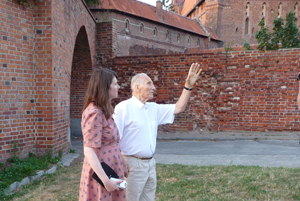
With the sun becoming less fierce, we headed to Malbork castle, about a half hour drive from the church but, in Kazik’s youth, meant crossing from Poland into Eastern Prussia (Malbork is now officially a part of Poland). En route to the castle, he started singing Polish songs and reciting Polish poetry, teaching me the Polish National Anthem. Approaching the castle we saw the Nogat River, a tributary of the Vistula River, which prompted another story of adventure. ”I wanted to see the world ever since I was a young boy,” said Kazik, keeping his gaze on the road. “I had a German friend, Erwin Schultz. We were nine or ten when we decided to go to Malbork. We swam across the Vistula River, across the border and approached the castle. We stood there staring at it and chatting, but we spoke Polish and a policeman heard us. He took us to a police station and we spent the night there. My dad, who came to fetch us, had to pay for our release. I thought he would kill me; it was such a lot of money. But he didn’t even touch me. He knew it was my passion to see the world.’’
Looking at the impressive, towering structure – to this day, Malbork remains the world’s largest brick Gothic castle – it was easy to imagine the feeling of awe young Kazik and Erwin must have felt standing there all those years before. Walking around the grand castle grounds, which once enclosed a full 52 acres of land, the impact of the Nazi invasion was as visible on the brickwork as it was in Kazik’s expression. Half of the castle had been destroyed in combat in 1945, though a large-scale rebuilding programme and designation as a UNESCO World Heritage Site covered up the full extent of the hardship it had witnessed. In spite of all the damage, the castle still felt like a magical place of special importance to Kazik. Nearing the riverbank, we walked right up to the water’s edge, picked up some stones and threw them into the water. “Let all that is bad be washed away,” Kazik whispered into the stones. Moved to tears, I quietly hoped that his wish would come true and that he would finally get the peace of mind he deserved. That simple, unprompted plea was such a pure moment of desire that I’ll remember it always.
Kazimierz Piechowski did not become a free man at the age of 22 years when he escaped from Auschwitz in 1942. He joined the Polish Underground Army and The Partisans, which was largely made up of boy and girl scouts, and fought with them until the end of the war in 1945. After the war, when Poland was annexed to the Soviet Union, Kazik’s involvement in the Underground Army led to imprisonment in a Soviet jail for 10 years. He then remained under constant surveillance in Poland until communist rule was finally overthrown in 1989 and Poland became what is constitutionally known as the Third Polish Republic. In the last 20 years, Kazik has visited over 60 countries and has amassed archival material spanning seven books and countless periodicals, and through his lectures he continues to share his firsthand knowledge of Auschwitz with people from all over the world.
Meeting Kazik has been a humbling and life changing experience for me. Once I only had the written and documented sources to inspire me; now I have a living memory source who has cast the world of Polish history and the conflicts of World War II, before and after, in a new light for me. I was so inspired by his character and his dignity, and that we could talk so openly and candidly about many different subjects. What Kazik has taught me is that one must always have hope and the strength of mind to believe in true and pure friendship. So that, while good doesn’t always triumph over evil, the most important thing we have is the memories of the people who are no longer with us.
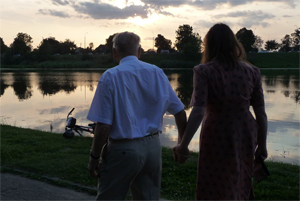
I arrived in Poland knowing that I would have an incredible experience meeting Kazik, but I left with so much more than I could imagine. I left knowing that I now have a Polish Grandfather and two wonderful human beings as friends. Crucially, it was the music that linked us, the sounds and vibrations connecting our Polish roots, proving once again that creativity transcends age and nationality and social backgrounds. I guess music really is the universal language of the soul.
* * *
Katy Carr
These four blogs are dedicated to the millions of innocent people who were transported to and murdered in the Nazi German concentration camps during World War II. Kazik has asked me to thank the late Polish poet Zbigniew Herbert, who wrote to the survivors of Auschwitz urging them “to give the world the truth”.
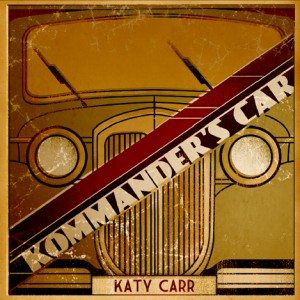
Katy’s new album, Coquette, is out now. The single, ‘Kommander’s Car’, is released on November 23. Katy plays an album launch gig tomorrow night at London venue The Wilmington Arms. Free entry!
